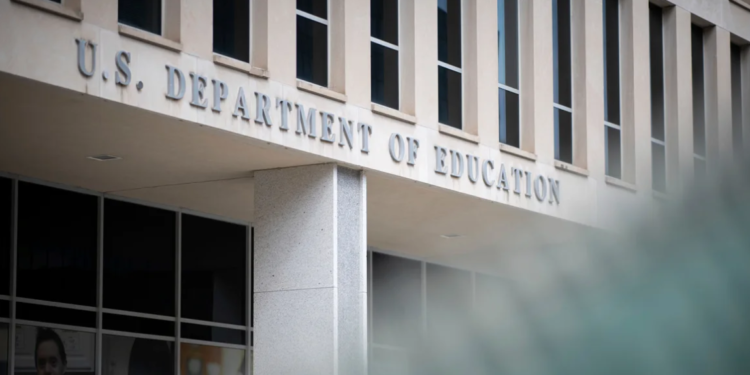March 18, 2025 Story by: Editor
WASHINGTON (AP) — The Office for Civil Rights (OCR) within the U.S. Education Department, traditionally recognized for ensuring students receive disability services, has taken on a new role under President Donald Trump. The agency is now actively engaged in his administration’s political priorities, leading to significant shifts in enforcement and case handling.
Under Trump-appointed leadership, thousands of pending civil rights cases have been halted while new investigations aligned with the president’s agenda have been launched. Career staff members have been sidelined or pressured to resign, with remaining employees directed to prioritize cases involving antisemitism, transgender issues, and complaints against diversity, equity, and inclusion (DEI) initiatives.
A memo issued Friday by the office’s chief designated antisemitism cases as the top priority. This move follows recent controversies surrounding pro-Palestinian protests on college campuses that led to allegations of anti-Jewish bias. Additionally, the administration has taken punitive measures, such as cutting $400 million in federal funding to Columbia University. This action came shortly after immigration officials arrested a Palestinian activist involved in student demonstrations at the school.
Disability, Racial Harassment Cases Put on Hold
As OCR redirects its focus, cases involving students with disabilities and racial harassment—traditionally a core part of its work—have been left in limbo. The transition between administrations typically brings a temporary pause in civil rights investigations, but Trump officials imposed an unusually lengthy and rigid freeze.
Although the freeze was lifted for disability cases on Feb. 20, it wasn’t until last week that newly appointed Education Secretary Linda McMahon announced all cases could proceed as usual. In contrast, during the first month of Trump’s presidency, OCR resolved around 50 cases, whereas more than 3,000 were addressed in the same period during his first term. Under former President Joe Biden, nearly 500 cases were resolved in a similar timeframe.
Even urgent cases that historically received priority were stalled. Staff attorneys were instructed to ignore outside communications, leaving families without updates.
One OCR employee, speaking anonymously due to fear of retribution, described the frustration of parents who desperately sought accommodations for their children’s disabilities. “We were just ignoring their emails,” the staffer said.
Parents Left Without Answers
Tylisa Guyton, a parent from Taylor, Michigan, filed a complaint with OCR on Jan. 20, alleging racial discrimination against her 16-year-old son. She claimed a white school administrator in a suburban Detroit district unfairly targeted him and other Black students, leading to repeated suspensions. Her son has been out of school since Dec. 4, yet despite the case backlog clearing, she has not received any response from OCR.
“He’s still asking every day, ‘When can I go back to school?’” Guyton said.
The memo issued Friday emphasized that antisemitism cases are now an “investigative and enforcement priority.” While it stated that this does not mean other civil rights enforcement efforts are being “deprioritized,” staff members fear the agency’s shrinking workforce will be stretched too thin to handle all cases effectively.
On Monday, the Education Department sent letters to 60 colleges, warning that institutions failing to protect Jewish students from harassment risk losing federal funding. Among those targeted were Harvard, Cornell, and other schools where pro-Palestinian demonstrations sparked accusations of antisemitism.
Politics Drive Civil Rights Priorities
Political influence has always played a role in shaping OCR’s agenda, with past Republican officials accusing the Biden administration of overreach in cases related to COVID-19 mask mandates and transgender rights. However, longtime employees say this is the first time they have witnessed politically driven cases completely overshadowing the office’s typical workload.
Trump has repeatedly called for dismantling the Education Department, dismissing it as a “con job” infiltrated by leftist ideology. During her Senate confirmation hearing, McMahon suggested that OCR might be better suited under the Justice Department’s jurisdiction.
Despite the freeze, some cases are slowly moving forward. However, special education advocate Marcie Lipsitt from Michigan warned that accountability within the department has significantly weakened.
“I’ve said to everyone, ‘You’re going to have to fight harder for accountability because there will be no accountability at the U.S. Department of Ed, if there is a U.S. Department of Ed,’” Lipsitt said.
Investigations Reflect New Priorities
In addition to shifting focus away from traditional cases, OCR has launched several “directed investigations”—proactive inquiries initiated by the agency rather than responding to external complaints. Many of these cases aim to pressure universities into restricting transgender athletes from competing or cracking down on pro-Palestinian protests.
The agency now faces an increasing workload with a diminished workforce. Following Trump’s directives against DEI initiatives, dozens of department employees were placed on leave, and many others accepted buyouts. As a result, some regional OCR offices are now operating without leadership in key positions.
Changes in procedural rules could also have significant consequences. For example, OCR now requires complainants to submit a signed consent form to proceed with an investigation. Previously, the office sent reminders if a form was missing, as many parents were unaware of this requirement. However, under new policy guidelines, these reminders have been eliminated, leading to more cases being dismissed due to technicalities.
Fear Among Advocates for Students’ Rights
Faced with these bureaucratic hurdles, some special education advocates have begun directing complaints to state agencies instead. Brandi Tanner, an Atlanta-based psychologist and advocate, said uncertainty about OCR’s role under the Trump administration has left disability rights activists deeply concerned.
“It’s kind of like, we’re very scared about what else is going to continue to come down the pike,” Tanner said. “Are students going to lose their rights?” Source: Yahoo News

















